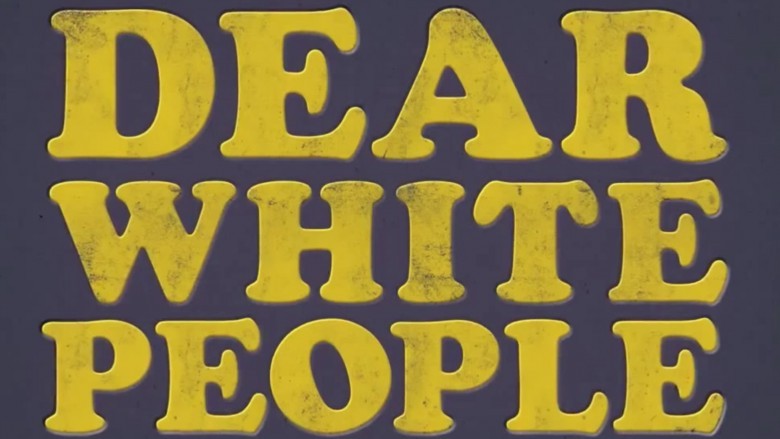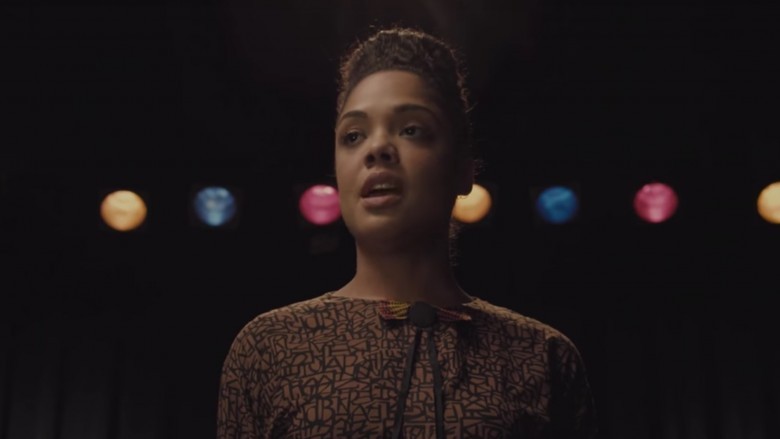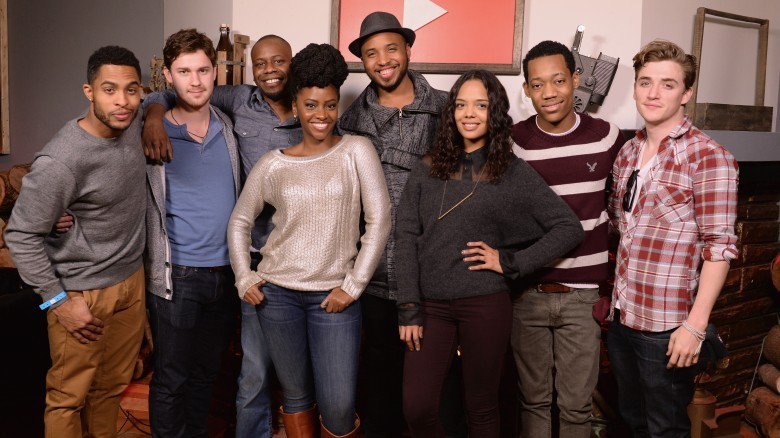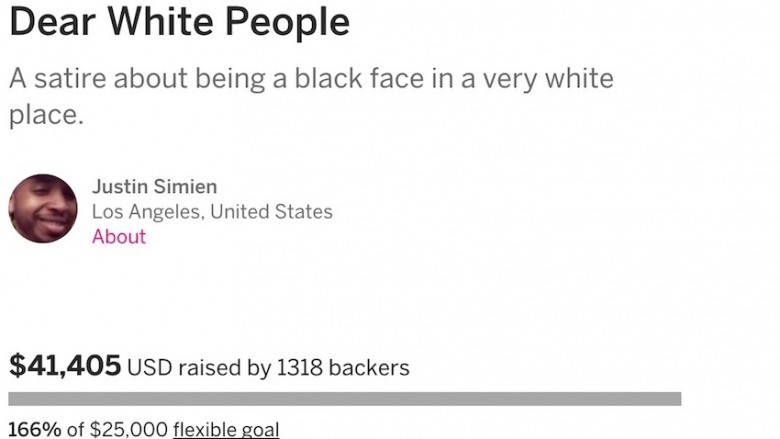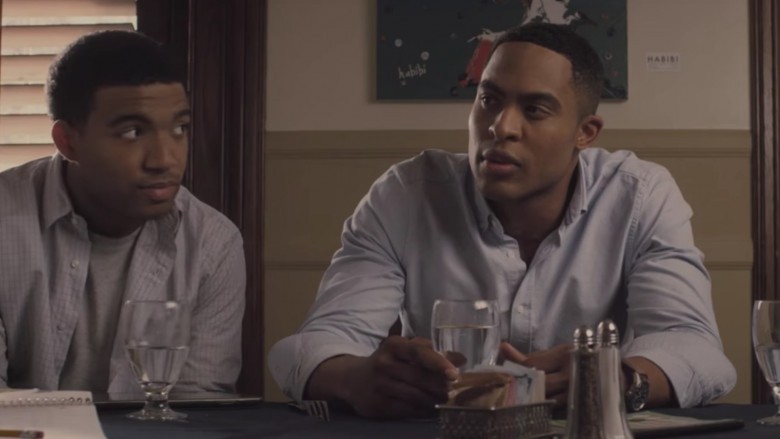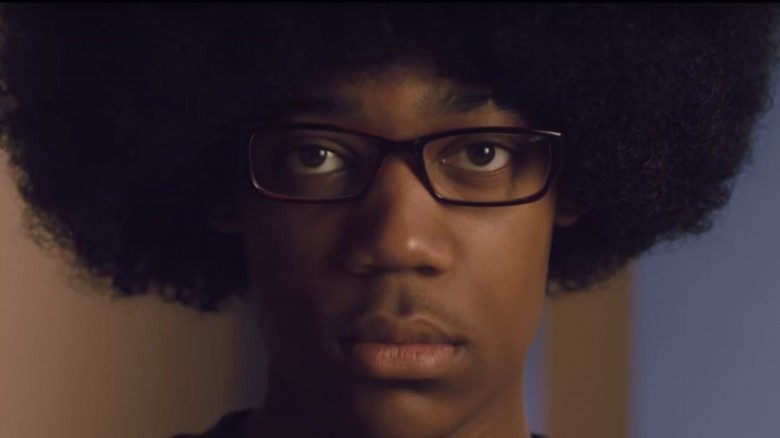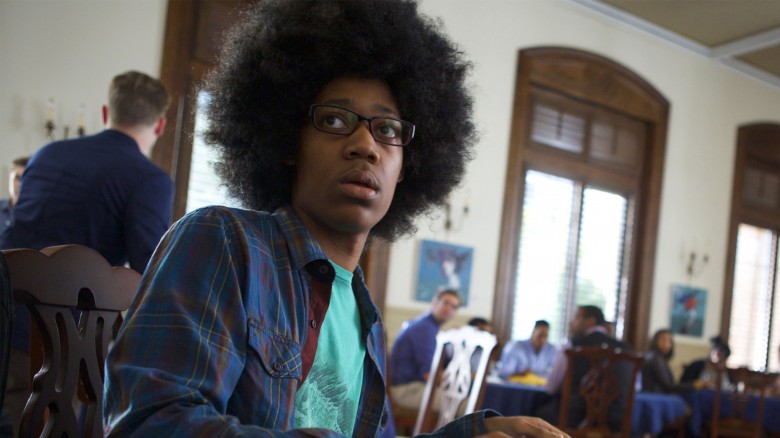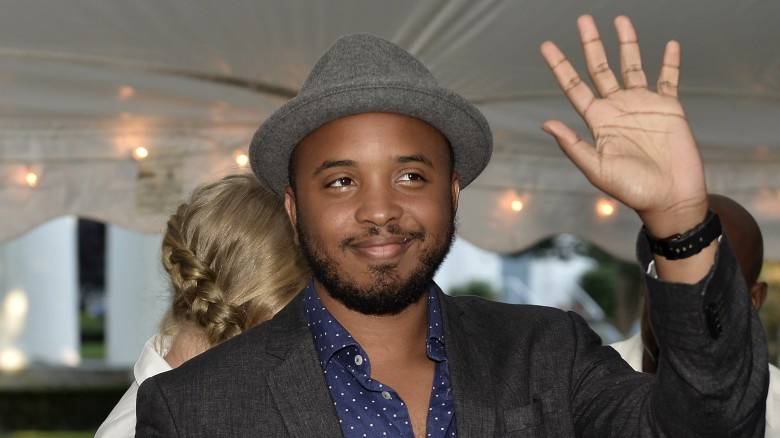The Untold Truth Of Dear White People
After a successful unveiling at the Sundance Film Festival in 2014, writer-director Justin Simien's Dear White People hit theaters later that year. Provocative, brutally funny, and brutally honest, the satirical comedy examines racial politics and tensions at Winchester University, a fictional (and not very diverse) Ivy League college. The plot involves a budding filmmaker and radio host named Sam White (Tessa Thompson) who broadcasts a radio show that takes white people to task for appropriating black culture, takes viewers into a blackface party thrown in response by some staffers from the campus humor magazine Pastiche, and shows lots of characters trying to fit in while staying true to their own identities. The movie is soon to be a Netflix series, so here's a look at the untold truth of Dear White People.
It was almost a TV show to begin with
Netflix has ordered a 10-episode TV series version of Dear White People to begin streaming in 2017, but the project was almost a TV series from the very beginning. One of Simien's early drafts was 265 pages (in which one page equals about a minute of screen time) and he toyed with the idea of "trying it as a TV pilot or an overwritten feature." Early on, it wasn't even called Dear White People. When Simien pared the script down to that of a regular, feature-length film, it was called 2%, as the number of black students at the movie's college made up two percent of the population. Simien shared some early versions of what would become Dear White People in a Los Angeles scriptwriters group, which is where he met one the film's producers, Lena Waithe (now co-starring on Netflix's Master of None).
It took a long time to make
The journey from idea to screenplay to finished film was excrutiatingly long for Simien. He says he wrote his first draft of what would become Dear White People in 2005, and the script wasn't ready to be read aloud and workshopped with actors until 2011. After workshopping the script, he knew he had something special, so in 2012, Simien made a trailer for the movie, which didn't actually yet exist—it was more of a statement of what the movie would feel like, and was intended to drum up interest and financial investment. But the trailer went viral online, as did another pre-production marketing tool that Simien devised, a "Dear White People" Twitter feed. ("I think the first one was 'Dear White People, the 'Single Ladies' dance is dead. Leave it alone,' or something else to that effect," Simien said on NPR's Fresh Air.) Those pointed bits of comedy are echoed in Sam's titular and controversial radio show in the movie.
It was crowdfunded
A lot of movies begin life as crowdfunded projects, but few of them make it all the way to a full production and national release. After the trailer and Twitter feed exploded in popularity, Simien thought he might be able to parlay his project's online popularity into crowdfunding, so he started an Indiegogo campaign with a modest goal of raising $25,000. He ended up raising $40,000—and the offers came rolling in. Lured in after the campaign's successful conclusion, studios and distributors started approaching Simien; he signed with Code Red Films, which agreed to provide the remainder of the film's funding while also affording Simien creative control.
The school is (mostly) fictional
Simien based the movie in part on his years at Chapman University. He grew up in a very multicultural part of Texas, but Chapman is located in a very wealthy, very conservative, and mostly caucasian part of southern California. Chapman shared those characteristics, but more than that, according to Simien, it was full of students who'd never really interacted with anyone from another culture. He combined these experiences with research he did on the black experience at Ivy League schools, because he thought it would be more interesting and lead to more dramatic tension to set it at a super-prestigious school. It all led to the creation of the realistic (but technically fictional) Winchester University.
Justin Simien based Lionel on himself
One of the main characters in Dear White People is Lionel (portrayed by Tyler James Williams of Everybody Hates Chris and The Walking Dead). In a movie about the struggle for different types of people to fit in with each other and co-exist, Lionel has an especially rough time: In the predominantly white, conservative-leaning college, he's a gay, African-American geek. Dear White People writer-director Justin Simien is himself a gay African-American, and he explicitly based the character of Lionel on himself. ("I listen to Mumford & Sons and watch Robert Altman movies," Lionel says at one point, naming two of his favorite things that he worries make him "not black enough" to join the Black Student Union.) He wanted to see somebody like himself on screen, or anywhere really, because he'd never seen himself fully represented before. "If the Lionel character existed in the world," Simien says, "that would've completely transformed the way I saw myself."
The party mirrors real-life events
The movie's climactic scenes go down at a party thrown in part as a response to Sam's Dear White People broadcasts—a bunch of white students wear blackface at an "unleash your inner negro" party. It's very shocking, but it's based in reality. When Simien was in college, he heard about similar parties on campus. "There were coded parties, there were 'the pimps and the hoes' parties...a coded way of sort of coming as a black stereotype." In 2010, more than 100 students at UC San Diego protested a fraternity's racially suggestive "Compton Cookout" party. In 2013, a fraternity at Arizona State University held a party to celebrate Martin Luther King Jr. Day, in which guests wore basketball jerseys, flashed "gang signs," ate watermelon, and wore blackface.
It's loaded with references to classic films
Simien went to film school, which unsurprisingly means he's got both a deep affection for and encyclopedic knowledge of movie history, and he loaded Dear White People with references and visual homages to some of his favorite films. A close-up of Sam speaking into the microphone during her campus radio show is meant to evoke the disc jockey/narrator scenes in The Warriors. When some African-American characters are talking into the camera in front of a box office complaining about Tyler Perry movies, it's a reference to the "dance of the dead sequence" from the silent sci-fi classic Metropolis. (At the end of the scene, the collective, frustrated "oh man!" is a nod to Do the Right Thing.)
Simien also says that Dear White People has a "very special relationship" with Stanley Kubrick's 18th century period piece Barry Lyndon. "With Troy's character," Simien says, referring to the character played by Brandon Bell, "I found myself constantly referencing Barry Lyndon. "There's an exact shot quotation from Lyndon, when we meet the Pastiche gang, and they're musing over what their party should be. We were imitating this scene from Barry Lyndon where Barry is drunk and slumped over in his chair."
Simien does and doesn't like to be compared to Spike Lee
As a movie about racial identity, and simmering racial tensions threatening to boil over at any minute, Dear White People earned critical comparisons to the 1989 classic Do the Right Thing. (Although Dear White People is a comedy, and Do the Right Thing is decidedly not.) Simien has similarly been compared to Do the Right Thing director Spike Lee. He's certainly flattered by those comments—Lee is one of Simien's biggest inspirations, and they've even spoken at lectures together, such as at Stanford University in 2015. Yet Simien ultimately bristles at being held up next to Lee, because he doesn't want to be pegged as a filmmaker who only makes one kind of movie. "Spike Lee is a master filmmaker. To be mentioned in the same breath as him is an honor," Simien has said. "I'm not the next Spike Lee. I'm the first me."
The trailer made some people upset
When the first trailer for the Netflix series adaptation of Dear White People was released in February 2017, it was certainly welcomed by fans of the original movie specifically, and fans of satire more generally. In the teaser, the character of Sam (now played by Logan Browning) delivers another series of "Dear White People" suggestions, particularly which Halloween costumes are acceptable. (She basically tells white people not to wear blackface or go as Barack Obama.)
Some viewers—presumably unfamiliar with the film and its intellectual intent of exploring racial identity and cultural interactions—reacted negatively to the trailer. A number of people posted on social media that they thought the series was "anti-white" and subsequently canceled their Netflix memberships, urging others to follow suit. Simien responded to the outrage, saying that, "For me, it was really profound, encouraging in a weird way," and wryly adding that "It just brought more attention to the series."
